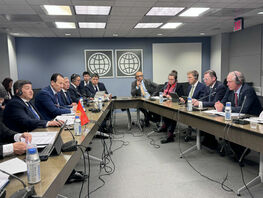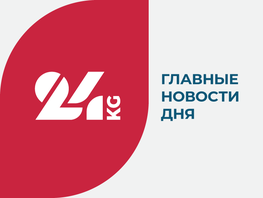Kyrgyzstan hosts an annual Festival of Documentary Films on Human Rights. Its final will take place on the World Human Rights Day — December 10.
The human rights organization Bir Duino Kyrgyzstan has been an organizer and ideological inspirer of the festival since 2007.
The films were screened online this year. Coronavirus made its adjustments. At least 14 documentaries and one fiction film — Box by a Russian film director Zhezilda Lima were presented to the jury.
Each festival has its own theme. The 2020 film competition was held under the motto: «How not to turn risks into disasters.»
The head of Bir Duino Kyrgyzstan, Tolekan Ismailova, told in an interview with 24.kg news agency what films participated in the selection, in what nominations and how successfully they manage to combine the human rights activity with the art.
— How did the idea of holding such a festival come about? Documentary is a very specific genre.
— The initiative to screen documentaries on the human rights protection topic was dictated by the events of 2007. If you remember, then the parliamentary elections were held, which accompanied by unprecedented violations. Reaction to the arbitrariness was «I don’t believe» protests. Their participants, including members of our organization, were put into the reception center of the Pervomaisky District Department of Internal Affairs in Bishkek. It was followed by detention for 10-15 days without trial or investigation. But this time, while we were kept in cold, dirty cells, where numbers were written in blood on the walls — in such a way people marked how much they had to spend there until they are liberated from this hell, made such a heavy impression that I decided that I had to tell about it.
It is necessary to convey to the public in what terrible conditions the people are kept. How brazenly their rights are violated by employees of closed institutions and how much these employees feel their impunity.
Tolekan Ismailova
We borrowed the experience from our Prague colleagues. I remember the first days of the competitive selection. We were poorly prepared technically then. Now we screen films in three languages with subtitles. At that time a simultaneous interpreter stood at the projector and translated them.
— Do you remember the first film? What was it about?
— I would like to immediately note such a moment. From the very beginning we believed in the success of our festival. Without this, we probably wouldn’t have succeeded. We found like-minded people quickly. Many young people supported us. One of the films that I remember is Dream. Rather, not even the whole documentary film, but a video about a boy from At-Bashi. It told the story of a teenager with a difficult fate, but with the will and desire to overcome all life’s difficulties, to break out of this vicious circle. And he succeeded. Of course, ideally, we would like to see such festivals supported by the government.
We can talk about development only in those countries, where the authorities are democratic and focused on protecting human rights.
Tolekan Ismailova
— Do the films always help their characters solve problems, achieve enforcement of their rights?
— Often, yes. What is the task of a film director and us as organizers? First of all, it is search for the truth. But finding it is half the work; you also need to get a reaction. Let me give you one example. In 2017, the festival featured a film by Azattyk journalist Ulanbek Egizbaev (died in July 2018) about a boy from Kochkorka. The child is disabled since childhood. He cannot walk and there were no ramps in the place he lived. Classmates laughed at him, did not want to be friends. Due to the inability to go outside, he was virtually cut off from the outside world. But after the film was released, ramps were built in Kochkorka. The film also won international appreciation. It left for New York with its creators.
Our festival is a help not only for young documentary filmmakers who want to make a name for themselves, but also a chance for those who are at risk and who have no opportunity to reach out to those in power.
Tolekan Ismailova
They are in a parallel reality.
— In recent years, the topic of violation of women’s rights has become relevant. They become victims of domestic violence, discrimination at work. Why didn’t you make this problem the theme of the festival?
— 14 films are announced for the competitive screening. They are mainly on ecology, climate change, clean water. Four films are from Kyrgyzstan. But the topic of gender is touched upon in one way or another in all the films. There are films with narrow orientation: They also dreamed. Stories of Dagestan women, Mrs. F, Versailles-1919. Return of dangerous women. They are all about women, about our rights. It’s the 21st century, and women are still vulnerable. Why? Because here, in Kyrgyzstan, in particular, we live in a patriarchal society.
Such notions as «uyat» (shame) have become aggravated. Because of this, many topics were banned. Radical patriarchy creates a terrible culture, gaps between the genders increase, man begins to play a dominant role, he suppresses, attacks. And a woman has no opportunity to defend herself. Access to justice is limited. All the levers of control are in the hands of men at the local level, a woman has no choice but to submit.
These threats to the position of women in society are supported by the government. Look what happens: if, for example, a woman is attacked and abused at work, then she cannot tell about it at home, find support in the family.
What about our migrants? Remember the film Ayka. Is such indifference, cruelty towards its own citizens possible in a state that observes the provisions of the Universal Declaration of Human Rights? No. You know, when you look at the works presented at this festival, you will see clearly, using the example of each family, whether in Mailuu-Suu, Syulukta or At-Bashi, how traumatized our people are. How great is the gap between the rich and the poor, between those who have all rights, forgetting about their duties, and those who have been deprived of these rights, being rewarded only with duties.
— It means that the topic of female and child violence is touched upon in the films participating in the competitive selection?
— Certainly. Child labor, unbearable conditions, slavery. Do you think slavery is only in neighboring countries, when our compatriots’ passports are taken away and they are forced to work in hard labor conditions on tobacco plantations for 20 hours a day? No. Here, literally in the suburbs of Bishkek, students who work as waiters are constantly humiliated, they are not paid their salaries, they are kicked out. The girls are harassed by drunk visitors, cafe administrators do not protect them. This is what our authors’ films are about. There was also a film about the fate of a human rights activist and prisoner of conscience Azimzhan Askarov.
— Screening was almost disrupted then ...
— Yes. It was in 2016. We arranged a screening at Manas cinema. When the lights went out, angry guys in red T-shirts, heavily-built women burst into the hall. They shouted insults, threw bottles at the screen.
The foreign ambassadors who were present were shocked. Askarov died, but we still cannot achieve justice, in order he to be found innocent posthumously and restored all rights, paid compensation.
Therefore, festivals like ours are very much needed. We must state the problem through art. Don’t be silent. It is not for nothing that we have made this the subject of a message, in order the risks not to turn into disasters.
— But the coronavirus pandemic has, on the contrary, revealed the previously existing risks, wormholes. And our authorities still do not have a national plan for overcoming the emergency.
— You’re right. And until it appears, we will continue to flounder. A state where the articles of the Universal Declaration of Human Rights are ignored cannot be called democratic. Therefore, we will continue our educational festival, otherwise these gaps between communities and global organizations will not be reduced.
You know, on the one hand, the pandemic has limited our capabilities, on the other hand, it has expanded them. All events are held in three languages. This year we launched a documentary film laboratory, based on the results of which the best project will be selected and then it will be implemented. Our festival is 14 years old, and we not only light the stars of national documentary filmmaking, we give people hope.





